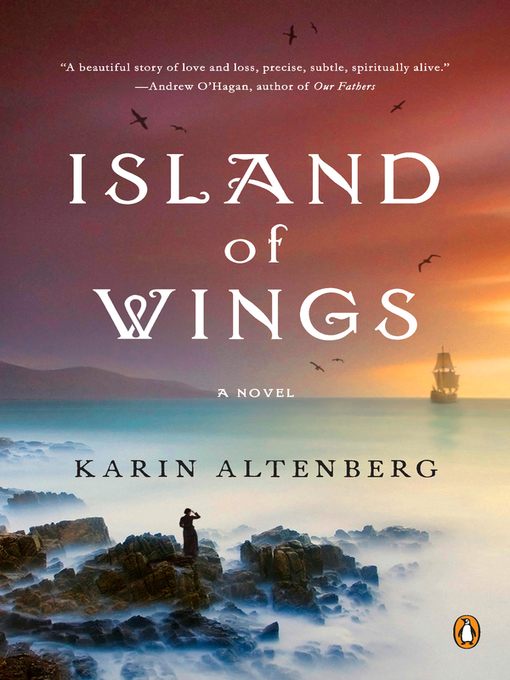
Island of Wings
A Novel
کتاب های مرتبط
- اطلاعات
- نقد و بررسی
- دیدگاه کاربران
نقد و بررسی

November 28, 2011
Swedish-born archeologist Altenberg imagines the internal struggles of two historical figures in her debut. In the summer of 1830, Rev. Neil MacKenzie and his wife, Lizzie, set sail for the island of St. Kilda. The couple is young and hopeful: Lizzie, pregnant and adoring her new husband; Neil, deeply spiritual and confident in his mission. Though St. Kilda is off the coast of Scotland, the MacKenzies step into a world completely foreign. The Gaelic-speaking natives live in filth and squalor, yet in perfect harmony with one another. Neil’s need to convert the idyllic natives becomes highly ironic, and he sees in Lizzie’s unfortunate miscarriage a grave trespass. As Lizzie battles loneliness and despair, Neil throws himself into converting the islanders (more for himself than for them), and the novel darkens. Altenberg’s book is deeply entrenched in historical detail, vivid in its descriptions of geography, and more successful as anthropological history than novel. A late passage, however, creates a moving portrait of the couple greatly changed by their hardships. Incorporating the politics of the creation of the Free Church out of the Church of Scotland, the story shows the limits of love and devotion—in people and in faith. Agent: Rogers, Coleridge & White.

December 1, 2011
A fictionalized account of 19th-century Scotsman Neil MacKenzie as he and his wife convert the natives of St. Kilda. In many ways this is the proverbial story of colonization--an earnest, naïve minister is sent to a distant shore to save souls and promote the Empire's notion of modernity. What makes MacKenzie's story so singular is that St. Kilda is located no more than 40 miles off the coast of Scotland, inhabited for 1,000 years by Gaelic-speaking Norsemen. When MacKenzie and his young wife Lizzie arrive in the summer of 1830, though they are to live in the newly constructed manse, they are shocked by the primitive conditions of the islanders. Shod in rags and island wool, the St. Kildans live in turf huts (in which every kind of waste is layered into the floor during winter) and only one in three children survive past their first week. The tax man (the island belongs to a laird on the mainland) comes a few times per year to collect his revenue in feathers and drop off supplies, but generally the islanders live in isolation. MacKenzie begins by drilling the catechism and in true British fashion comes up with a scheme to improve island productivity. As Neil is occupied with the St. Kildans, Lizzie lives in a solitude more profound than the islanders. Unlike her husband she speaks no Gaelic, and so must wait years for company when finally a maid is sent from the mainland. As the years progress Neil and Lizzie, devoted as newlyweds, fall into an icy truce. Before a kind of desperate madness transforms Neil into that familiar Kurtz-like figure, he manages to rebuild the village and divide the shared farmland. For the communal St. Kildans, whose interdependence is vital, this new scheme of individuality has dire consequences. In this winning debut, Altenberg, a trained archaeologist, brings a subtle voice to this odd bit of history, in which faith and marriage are no match for isolation.
(COPYRIGHT (2011) KIRKUS REVIEWS/NIELSEN BUSINESS MEDIA, INC. ALL RIGHTS RESERVED.)

November 15, 2011
When young Church of Scotland minister Neil MacKenzie arrives with his wife, Lizzie, on the Scottish archipelago of St. Kilda in 1830, he intends to strengthen the residents' Christian faith and modernize their way of life. The remote, treeless islands house thousands of seabirds that provide much of the local food and influence numerous customs. Determined to set an example of righteousness and haunted by guilt over a friend he let drown, Neil fears expressing love for anyone, even his wife and children. Although he can communicate with residents in their native Gaelic and Lizzie knows only English, she achieves greater empathy, particularly with the women after she loses three babies. Lizzie finds companionship with an English-speaking girl hired to help her and later is drawn dangerously close to a shipwrecked sailor she nurses back to health. VERDICT Based on documentary sources, this evocative debut novel enmeshes readers in a society that no longer exists, on rugged Scottish islands few tourists visit. Complex characters and historical events that impact the lives of the islanders provide much to ponder and discuss. A fine book club candidate.--Kathy Piehl, Minnesota State Univ. Lib., Mankato
Copyright 2011 Library Journal, LLC Used with permission.

Starred review from December 1, 2011
Haunting yet beautiful, dark yet poetic, Altenberg's debut chronicles the exceedingly harsh lives of a group of determined early-nineteenth-century people living on the islands of St. Kilda. Located in the remotest part of the British Isles off of Scotland, the main island is home to tenacity, fear, and newly arrived, fervently passionate minister Neil MacKenzie and his wife, Lizzie. Buoyed by those all-too-human tenets of faith, hope, and courage, the islanders provide uncertain shelter for the new residents. As Lizzie adjusts to life amid the superstitious folk who live in horrifyingly primitive conditions, she relies heavily on her personal love for and faith in her husband as he charts an increasingly evangelical and image-conscious journey on his own path to God, one that he believes must be adhered to by everyone else with a stringency that demands a painfully high price. The sorrow of the almost-certain death of newborns constitutes the narrative's most perilous thread, one that affects all on the island. Lizzie's own faith is tested as the years pass, and she creates her own patterns and rhythms in a sometimes volatile home life on the not-entirely-welcoming island. Drawing on historically accurate roots, including real-life figures Neil and Lizzie MacKenzie, Altenberg creates a mesmerizing tapestry that will surely linger in the reader's mind.(Reprinted with permission of Booklist, copyright 2011, American Library Association.)

























دیدگاه کاربران